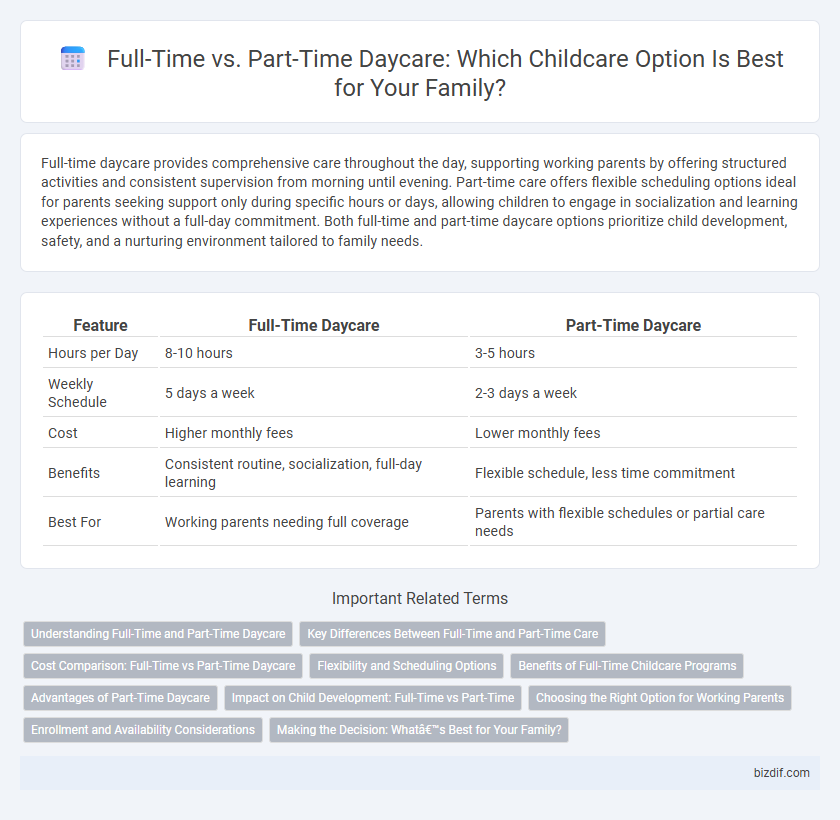Full-time daycare provides comprehensive care throughout the day, supporting working parents by offering structured activities and consistent supervision from morning until evening. Part-time care offers flexible scheduling options ideal for parents seeking support only during specific hours or days, allowing children to engage in socialization and learning experiences without a full-day commitment. Both full-time and part-time daycare options prioritize child development, safety, and a nurturing environment tailored to family needs.
Table of Comparison
| Feature | Full-Time Daycare | Part-Time Daycare |
|---|---|---|
| Hours per Day | 8-10 hours | 3-5 hours |
| Weekly Schedule | 5 days a week | 2-3 days a week |
| Cost | Higher monthly fees | Lower monthly fees |
| Benefits | Consistent routine, socialization, full-day learning | Flexible schedule, less time commitment |
| Best For | Working parents needing full coverage | Parents with flexible schedules or partial care needs |
Understanding Full-Time and Part-Time Daycare
Full-time daycare typically involves care for eight or more hours per day, providing consistent support for working parents and fostering stable routines for children. Part-time daycare offers flexible, shorter hours catering to families needing occasional or limited care while promoting socialization and early learning during key developmental stages. Understanding the differences in schedules, costs, and educational benefits helps parents choose the best option for their child's growth and family needs.
Key Differences Between Full-Time and Part-Time Care
Full-time daycare typically involves child supervision for 8 to 10 hours per day, providing consistent routines and extended social interaction that supports developmental milestones. Part-time care generally ranges from a few hours up to 4 hours daily, offering flexibility for parents with varied schedules while still promoting early childhood socialization. Cost differences are significant, with full-time care often requiring higher fees due to longer hours, while part-time care presents a more affordable option without compromising quality education and care standards.
Cost Comparison: Full-Time vs Part-Time Daycare
Full-time daycare typically costs more due to extended hours and increased staff requirements, averaging $10,000 to $15,000 annually, while part-time care can reduce costs by up to 50%, depending on the number of days attended. Many families find part-time daycare offers flexibility and savings without compromising early childhood education quality. Cost factors also include location, age of the child, and additional services such as meals and extracurricular activities.
Flexibility and Scheduling Options
Full-time daycare offers consistent scheduling with dedicated hours, ideal for parents needing stable and predictable care throughout the workweek. Part-time daycare provides flexible attendance options, allowing families to customize care based on irregular work hours or specific days. Many centers accommodate both models, enhancing adaptability to diverse family routines and improving access to quality early childhood education.
Benefits of Full-Time Childcare Programs
Full-time childcare programs offer consistent routines that support early childhood development and socialization by providing structured activities throughout the day. Access to trained educators in full-time settings enhances cognitive and emotional growth through continuous learning opportunities. Families benefit from reliable childcare schedules, enabling better work-life balance and reduced stress.
Advantages of Part-Time Daycare
Part-time daycare offers flexibility for parents with varying work schedules or those seeking gradual socialization for their children. It provides cost savings compared to full-time care while still supporting early childhood development through structured activities. This option allows children to adjust to group settings without the intensity of full-day attendance, fostering social and emotional growth.
Impact on Child Development: Full-Time vs Part-Time
Full-time daycare provides consistent social interaction and structured routines that enhance emotional stability and cognitive development in children. Part-time care offers flexibility while still supporting essential skill-building and socialization, beneficial for children needing more parental time. Both arrangements influence child development differently, with full-time care often accelerating independence and part-time care promoting gradual adjustment to group settings.
Choosing the Right Option for Working Parents
Full-time daycare provides consistent, structured care typically 8 to 10 hours daily, ideal for working parents with demanding schedules needing reliable child supervision. Part-time care offers flexible hours, ranging from a few hours to half-days, suitable for parents with variable or reduced work commitments seeking socialization and developmental activities for their children. Selecting between full-time and part-time care depends on work hours, budget, and the child's social and developmental needs to ensure optimal support for both parent and child.
Enrollment and Availability Considerations
Enrollment in full-time daycare programs often requires early registration due to limited availability and high demand, ensuring consistent care throughout the week. Part-time care offers more flexible enrollment options, accommodating families with varied schedules but may have fewer spots, depending on the center's capacity and staffing. Availability considerations highlight that full-time slots typically fill faster, while part-time programs may adjust enrollment based on seasonal or peak hours.
Making the Decision: What’s Best for Your Family?
Choosing between full-time and part-time daycare depends on your family's schedule, budget, and your child's social and developmental needs. Full-time daycare provides consistent routine and extensive interaction, ideal for working parents requiring structured care throughout the day. Part-time care offers flexibility and reduced costs, suitable for families seeking occasional support while maintaining significant parental involvement.
Full-time care vs part-time care Infographic

 bizdif.com
bizdif.com